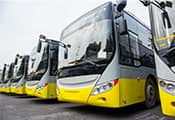Pick Up Van Insurance
Pick up van insurance is a type of commercial vehicle insurance that protects a pick up van from any loss or damage occurring due to any unforeseen emergency.A pick up van is essentially a mini truck or a vehicle with a front cabin and an open cargo space at the rear
What Is Pick Up Van Insurance?
A pick up van insurance is a legally mandatory commercial vehicle insurance policy that provides coverage against any loss or damage caused to the vehicle in an unexpected incident such as road accident, natural calamity, manmade disaster, etc.
Types of Pick Up Van Insurance Plans
Motor Insurance companies in India offer two types of commercial vehicle insurance for pick up vans-
- Liability Only/ Third Party Pick Up Van Insurance Plan: Under this plan, the policyholder is protected against any third party liabilities that may have arisen due to the insured pick up van. It covers any losses or damages caused to third-party vehicles, property or person due to the insured pick up van. The third party commercial vehicle insurance for a pick up van does not cover any damage caused to the vehicle itself.
- Comprehensive Pick Up Van Insurance: Under a comprehensive up van insurance, the insurer is liable to pay for both third party liabilities as well as damages sustained by the insured vehicle. The policy covers any loss or damages incurred by the van due to accidents, theft, vandalism, fire, natural calamities, manmade disasters or during transit. It also protects the owner-driver of the insured van against any bodily injuries suffered while driving it.
Third Party Pick Up Van Insurance vs Comprehensive Pick Up Van Insurance
The following table represents the extent of coverage offered by the liability only and comprehensive pick up van insurance plans:
| Coverage | Liability Only Pick Up Van Insurance Plan | Comprehensive Pick Up Van Insurance Plan |
| Liabilities to Third Party | Included | Included |
| Own Damage Cover | Not Included | Included |
| Personal Accident Cover for Pick Up Van Owner-Driver | Mandatory to Buy | Mandatory to Buy |
Commercial pickup truck insurance covers the vehicle from any unfortunate mishaps that may lead to loss or damage to the vehicle and its driver. If you seek coverage for the goods that your pick up van is transporting from one place to another, then you need to additionally purchase a transit insurance policy.
Why Should You Buy A Pick Up Van Insurance?
Commercial pick up van insurance can be beneficial for the vehicle owner in many ways. Take a look at the reasons why you must buy commercial pickup truck insurance:
- Legal Requirement: Everybody who owns a pick up van and uses it on public roads needs to purchase a valid pick up van insurance with at least a coverage for third party liabilities. People who defy this law and are caught without an insurance policy for the van will be liable for legal action.
- Protects from Sudden Emergencies: Unforeseen incidents can cause major damages to your pick up van. A pickup van insurance shields you from any mishaps and helps you overcome any loss or damages without any worries.
- Prevents Business Loss: Pick-up vans may be playing a major part in your business. Any unforeseen damage to the vehicle can not only lead to the burden of getting it repaired but may also lead to losses in your business. However, if your van is insured under a pick up van insurance policy then such business losses can be easily prevented.
What are the Benefits of a Pickup Van Insurance?
Pick up van insurance comes with lots of attractive features and benefits. You can check the same below:
- Covers All Types of Vans: A commercial vehicle insurance for a pick up van covers all types of pick up trucks irrespective of the make & model and the purpose for which it is being used.
- Round the Clock Assistance: Most pick up van insurance comes with round-the-clock assistance. This means you can reach out to your insurer for a claim support 24x7.
- No Claim Bonus: Insurers also offer a discount called the No Claim Bonus to those policyholders who did not raise any claims in their previous policy term. It is a reward granted to the policyholder to promote responsible usage of the vehicle while renewing the insurance and helps in reducing the premium.
- Cashless Garages: All motor insurance companies in India have a network of cashless garages where the insured vehicle will be replaced without making any payment. The repair bill is directly paid by the insurance company.
Coverage Under Pick Up Van Insurance?
Before buying pickup van insurance, you need to understand the scope of coverage available with a commercial pickup truck insurance policy. Take a look at the various incidents and situations that are covered under the pickup truck insurance:
- Accidents: Damages caused by a collision or road accident.
- Liabilities to Third Party: Any loss or damage to the property of a third party person
- Natural Calamities: Losses or damages caused following the occurrence of natural calamities, such as earthquake, tsunami, flood, landslide, etc.
- Fire: If the insured vehicle gets damaged in a fire
- Vandalism: Any loss or damages caused to the insured van due to acts of vandalism
- Theft: In case your pick up truck gets stolen, then your insurance company will pay the IDV (Insured Declared Value)
- Manmade Calamities: Any loss or damages caused to the pick up van due to manmade calamities, such as riots, strikes, etc.
There are a few expenses and unfortunate situations that are excluded under a pick up van insurance. They have been listed below:
- Illegal Driving: Losses incurred while the driver was not complying with rules or illegally driving such as overspeeding, rash driving, driving without a license, etc..
- Normal Wear and Tear: Any loss or damages caused to the pick up van as a result of normal wear and tear.
- Contributory Negligence: If your van suffers any damages or losses due to the negligence of the driver.
- Drunk Driving: Driving under the influence of alcohol is a punishable offence. Therefore, any claims arising out of drunk driving will be excluded.
- Electrical and Mechanical Breakdown: If your vehicle suffers any loss or damages due to an electrical or mechanical breakdown.
- Consequential Damages: In case your pick up van suffers an indirect loss or damage. For example, property damage caused by the insured van while being towed to the garage.
- Depreciation: Any claims arising out of losses suffered due to depreciation of the vehicle
- War and Nuclear Perils: In case your pick up truck suffers damages or loss due to war, nuclear leak, warlike operations, nuclear radiation, etc
Types of Pick Up Vans Covered Under Commercial Van Insurance
There are two types of pick up vans that are covered under a commercial pickup truck insurance policy. They are:
- Single Cab Pick Up Van: A single cab pick up truck refers to those vans that have a single seating compartment at the front of the vehicle. This compartment consists of seats for the driver and the co-driver only.
- Double Cab Pick Up Truck: A double cab pick truck refers to the vans that have a double seating compartment at the vehicle's front. The compartment in such vehicles has additional seats for passengers behind the seats of the driver and the co-driver.
What are the Add-On Covers Offered Under Commercial Pickup Van Insurance?
Add-on covers are purchased to increase the level of coverage of your pick up insurance policy. Here is a list of the various add-on covers available under commercial van insurance:
- Roadside Assistance: Most motor insurance companies provide roadside assistance as an add-on cover. It is beneficial in several ways, such as flat tyre change, towing to the garage, fuel assistance, replacement of keys, etc.
- Personal Accident Cover for Passengers: This cover ensures that everyone travelling in the pick up truck, in addition to the owner-driver, is protected in case they suffer any bodily injuries in a collision.
- Windscreen Glass Cover: Few insurers may offer windscreen glass cover that provides coverage against any damages caused to the glass of your van's windscreen.
- Zero Depreciation Cover: Under this cover, the depreciating value of your pick up van is not considered while filing a claim. Without this cover, the maximum claim amount or the insured declared value (IDV) of your vehicle will be estimated after deducting the depreciation value from the current market value.
- Return to Invoice: With this cover, you can get a claim amount equivalent to the invoice value of the pick up van at which it was purchased, in case of theft or if your pickup van is totally damaged (beyond 75% of its current market value).
- No Claim Bonus Protection: This cover will allow you to retain or protect your no claim bonus discount even if you raise an insurance claim during the policy tenure.
How to File a Claim for Pickup Van Insurance?
There are two ways of filing a pick up insurance claim online. You can either make a cashless claim or can opt for a reimbursement claim. Take a look at the claim procedure for both cashless claims and reimbursement claims under commercial van insurance:
How to Make a Cashless Pick Up Van Insurance Claim?
To make cashless claims, the damaged vehicle should be repaired at one of the network garages of the insurance company. Below are the steps that need to be followed to make a cashless claim:
- Intimate your insurance company about the mishap
- The pick up van will be assessed to estimate the damage
- The cashless garage will make an estimation of all the repair work required
- Approval for repair will be granted by the insurance company
- The van can be sent for repair at the network garage
- After the repairs have been made, the garage will notify the insurance company and send them the final bill
- Submit all the required documents such as claim form, RC, policy copy, etc
- Bill amount will be paid to the garage directly by the insurance company
- In case the pick up van has been completely damaged and cannot be repaired, then the insurance provider will pay the IDV of the vehicle directly to the policyholder.
Steps to Make Reimbursement Pick Up Van Insurance Claim:
Reimbursement claims are those claims where the repair work was not carried out at a network garage of the motor insurance company. Here are the steps involved in a reimbursement claim procedure:
- Intimate the insurer about the unfortunate incident
- The pick up truck will be inspected for damage assessment
- Submit the estimate bill made by the garage
- The insurance provider will approve the repair work
- Send the damaged van to the garage for repairs
- Once the repair is complete, pay the entire bill amount
- Submit all the required documents to the insurer
- The insurance provider will pay the claim amount after documents evaluation
Documents Required for a Pick Up Van Insurance Claim
A claim will be successfully raised only if you submit certain documents to the insurance company in support of your claim. Below is the list of documents that you may need to submit at the time of making a claim under commercial pickup truck insurance:
- Filled-in claim form for pick up van insurance
- Copy of the driving license
- Copy of the van's registration certificate or RC
- Original estimate of loss
- Original invoice or bill for pick up van's repair
- Payment receipt of the repair bill
- Van keys (in case of theft claims)
- Copy of the police FIR (in case of third party liability claims)
- Non-traceable certificate (in case of theft claims)
- Discharge certificate issued by the garage
How to Buy Pick Up Van Insurance Online?
As soon as you purchase a pick up van, you should get it insured under a commercial vehicle insurance policy. You can easily buy the best pickup van insurance online using the steps mentioned below:
- Visit policybazaar.com and find the "Commercial Vehicle Insurance" option from the homepage.
- Fill up the form with the required details
- The premium for various pick up van insurance policy for different plans will be displayed
- Choose a plan that provides the best insurance for pickup trucks
- Select the add-on covers that you want in your policy
- Enter the details of your pick up van
- Upload the documents requested
- Review the plan details and check the final premium amount
- Pay the premium online using internet banking or bank cards
- You will be issued with a pick up van insurance policy
How to Renew Pick Up Van Insurance Policy?
To continue using your commercial pickup truck insurance at all times, you must renew it before it gets expired. People who want to renew their pick up van insurance online can follow the steps given below:
- Go to the official website of Policybazaar Insurance Brokers Private Limited
- Enter all the details required and click on submit
- Review the insurance plan and the coverage
- Select the add-on covers you want
- Check the pickup insurance price quoted to you
- Make an online payment of the pickup insurance price through bank cards or net banking
- Your pickup insurance policy will be renewed
9 Factors That Affect the Premium for Pick Up Van Insurance
A pickup insurance price for trucks is determined by keeping the following factors in mind:
- Type of Pick Up Van: The kind of pick up van you want to insure matters when it comes to the premium amount. The premium quoted for a single cab pick up van is lower than that of a double cab pick up truck.
- Weight of the Vehicle: Insurer would want to know the total weight of your loaded truck before quoting a pickup insurance price. The greater the weight of the van, the higher will be the premium charged to you.
- Coverage Type: More coverage comes at a higher price. Therefore, if you opt for comprehensive coverage, you will be quoted a higher premium amount than a liability-only insurance plan.
- Age of the Van: The age of the pick up van affects the cost of your commercial van insurance. The older your vehicle is, the lower will be the premium amount quoted to you.
- Nature of Van Contents: The contents of your pick up truck affect the premium amount quoted to you. If your truck is being used to carry hazardous things then the cost of your pickup van insurance will be higher.
- Service Location of the Van: The place where your pick up van will be used also determines the cost of the commercial van insurance policy. The pickup insurance price will be higher if you operate your van at a high-risk location, such as hilly areas as compared to low-risk areas, such as small cities.
- Modifications Made to the Vehicle: If your vehicle has been modified with additional features and accessories then the premium amount for your modified pickup van insurance will be higher than standard vans.
- No Claim Bonus: If you have no claim bonus discount and apply it at the time of your policy renewal, you will be required to pay a lower pickup insurance price for your vehicle.
FAQs
-
Q1. Do you provide breakdown cover under pick up van insurance?
Ans: Mechanical and electrical breakdown is not covered by commercial pickup truck insurance. However, some motor insurers may provide breakdown assistance as an add-on cover under this plan. -
Q2. Do I need insurance for my pick up truck?
Ans: Yes. It is mandatory for anybody who uses a pick up truck to possess a valid commercial van insurance policy with at least liability only cover before plying on public roads. If you are caught using the vehicle without valid insurance then you may be penalized. -
Q3. How can I check the weight of my pick up truck?
Ans: You should know the weight of your pick up van at the time of buying commercial pickup truck insurance. Following are the ways to check the weight of a pick up truck:
- At the tire and loading plate at the inside frame of the door at the driver's side
- Manual issued by the vehicle manufacturing company
- At the engine plate by opening the hood of the car
-
Q4. What will happen to my No Claim Bonus if my policy has expired?
Ans: In case your pick up truck insurance policy has expired, you can still retain your no claim bonus, provided you renew the policy within 90 days of your last policy expiry. -
Q5. Can I transfer my No Claim Bonus to a new pick up truck?
Ans: Yes. You can transfer you no claim bonus to a new pick up van as this bonus is granted to the owner-driver of the vehicle and not the vehicle itself.



















